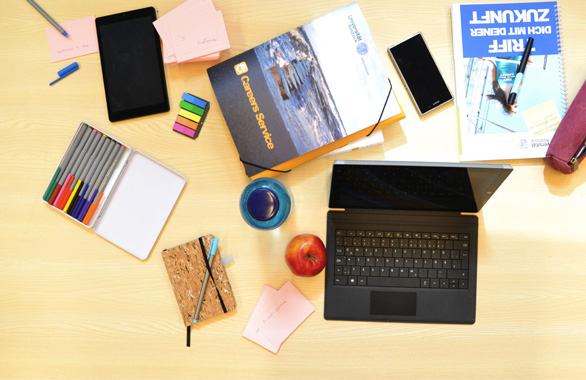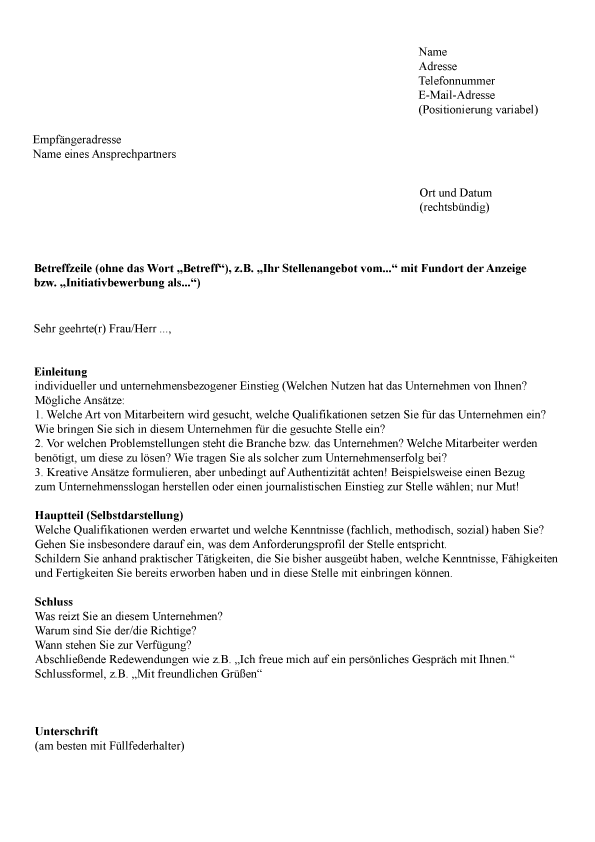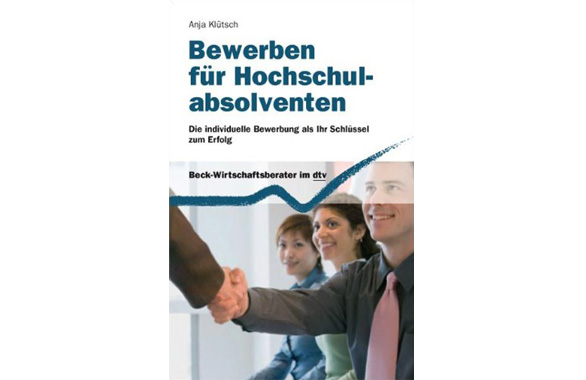Application
Below you will find a first overview of application tips for students and graduates who are about to apply. However, this information in any case does not replace a personal consultation or the various offers of competence development.
Application coaching
A competent appearance in the application process can seldom be selected. That's why, as part of our competence promotion program, we offer you high-quality job application coaching and other offerings that will prepare you fully for this new job and career transition. An overview of these offers can be found here.
Advice & application folder check
Open dates for our application portfolio check, please refer to our competence promotion Competence promotion. For an individual consultation to your personal profile or to the sighting of your documents you can arrange an appointment with us. Just send us an e-mail with your specific request and two appointment suggestions:
careersuni-rostockde
Application tips
Motivational letter
You would like to apply for a specific job offer or are looking for a job on your own initiative? In both cases, the cover letter should be as short as possible (max 1 page) and individually related to the respective company.
How and whether to make an creative application depends on you personally, but also on the job offered and the company. For example, an application in the marketing field can be more creative than an application in the public sector. For each application a clean form, a sufficiently wide margin, uniform fonts and a correct spelling are important.
When writing a letter, the following aspects should be considered:
- Which requirements are expected?
- What qualifications, experience and knowledge do you have?
- Were positive and constructive phrases chosen?
- Do all statements correspond to reality and are verifiable?
- Did you make empty statements? Does your own motivation affect the reader?
- Will they be curious to meet you?
- Do not repeat your CV in the cover letter as a text.
Curriculum Vitae
From your CV, the reader can get information about your past career and about your person as well. It is usually written in tabular form, handwritten in a few exceptions. The CV should be tailored to each job and should not be longer than 3 pages. Choose clear headlines for each stage of life and do not use obscure abbreviations.
Not all stations of your life are interesting for every job, for example a internship from 10 years ago. It goes without saying that your CV must be true. It should be complete and up to date.
The following information belongs to a CV:
- First and Last Name Address,
- telephone number and e-mail address
- Date of birth and place of birth marital status (- no information about parents, siblings, not up-to-date)
- denomination (only with tied employer education)
- School stations, type of school, graduation
- Higher education (name of the university, Subjects, emphases, Change of location, topic of exam work, stays abroad)
- Secondary employment during study / financing of studies
- Internships
- possibly vocational training (kind - Company - Training certificate,
- possibly work experience (Name of the activity, position - Name of employer - Location of the company - Time information)
- (vocationally relevant) further education
- linguistic proficiency
- Computer skills
- possibly foreign experience
- Hobbies / Leisure Interests
- other engagement
- Place, date and handwritten signature (best with ink pen)
There are several ways to sort these data: Chronological starting with schooling or chronological starting with the current position, organized by subject or the chronological order of the data (divided into blocks of topics). In recent years, the antichronological structuring of the CV has become increasingly accepted as a standard and is therefore recommended. However, basin on your individual biography and job posting you should try out all forms and decide on a case-by-case basis which variant fits better.
The third Page
With the third page you can direct the special attention of the reader to your application. Here you can list everything that qualifies you personally and professionally for the particular job.
Which functions can this page take on?
- To describe stations of your life in more detail (no "red thread", change of course, etc.)
- Your key qualifications – for example highligting Volunteer activities
- explain technical knowledge in more detail
- Explaining motivation, for example: "Why is an educational scientist is suitable in personnel consulting?"
- classify professional and personal skills according to requirement profile
As headline you could choose:
- What else you should know about me ...
- To my person:…
- My knowledge and experience:
The listed information should be comprehensibly to the reader. It is not enough if you write "I am resilient? (Why?)" Or "I am motivated".
It is important that this third page is unique for you alone! Check if only you can sign this page or if it fits to your friends as well. Then it would not be individual enough!
The application photo
The application photo has a great affect. Your potential employer already gets a first impression of you. Therefore, you should pay attention to the following things:
- Have the photo taken by the photographer
- the photo can be black and white or colored
- pay attention to your appearance during the photo session (hairstyle, clothes)
- In the photo, wear clothing that is appropriate for the job (for example blazer, tie) or the clothes that you would wear for the interview
- the photo should be slightly larger than a passport photo (e.g., 4.5 x 6 cm or 6 x 9 cm)
- Do not attach the photo with paper clips, but stick it on
- Write down your name on the back of the photo
- the photo should be up-to-date (not older than one year)
The facilities
The facilities are a component of the application documents. The attachments are exclusively copies. Certifications are not necessary. Never send originals!
The facilities include:
- Copy of the diploma
- if not yet available - the intermediate diploma, the certificate of the intermediate examination or also a grading sheet
- internship certificates
- possibly copies of certificates of vocational training
- job references
- possibly certificates of relevant further education
- high school diploma
If you enclose several enclosures (10 to 20), it is advisable to attach a list of attachments on top. The attachments are filed behind the CV or third party page.
The shipping
Now that you have compiled all documents, you should prepare the shipping of your application with great care:
- Use e.g. Folders in a neutral color (unless you apply in the marketing area or similar).
- Avoid transparent sleeves.
- The application letter is placed loosely on the application folder.
- Use the folder only once (you can see it otherwise).
- File the content in either ascending or descending order.
- Use a sufficiently large envelope (with reinforced back).
The interview
Congratulations! You have succeeded with your application and received an invitation to a job interview.
Before you go to the interview, a good preparation is important. Get accurate information about your future employer by now. - How many employees does the company have? What is produced in the company? What is the philosophy of the company? etc. - Mostly you get this information from the internet or from print materials.
Next you should plan how you want to proceed before the appointment. Because a job interview is always a "marketing in its own right" - "You'll never get a second chance to make a first impression." Pay attention to your hairstyle and your clothes! It is recommended e.g. a blazer or a suit with a tie. Avoid eye-catching colors (rather conservative the first time, later you can still orient yourself to the colleague.) Leave early enough to avoid delays caused by traffic jams, mishaps, etc. If you have a long journey, clarify in advance if you will get the travel expenses replaced. This saves disagreements in hindsight.
Interview Guide
The following questions may be asked in your interview:
1. Welcome / Warming up
- Presentation of the participants in the conversation (handshake, wet hands)
- possibly address nervousness
- Comments on arrival / a current political event or similar
- Justification of the invitation
- Often the interests of your CV are taken as a hanger
- Be prepared for drinks
- Clarify the course of the conversation
- Responding to the applicant's personal situation
- Tell your CV
- Describe your childhood
- Family situation
- Hobbies
2. School, education
- Favorite subjects
- Reasons for study choice
- satisfaction with the study
- Why did your studies take so long?
- reasons for change of location
3. Professional development
- Why did you apply?
- Why do you think you are suitable for the position?
- What professional wishes, goals and ideas do you have?
- Where do you see your strengths for this job?
- Are your skills sufficient for these tasks?
- Where do you want to be in five years?
- What attracts you to our company?
- What working conditions are important to you? What do you do if that is not the case?
- Do you enjoy working in a team?
- For women: What is your life planning?
- Would you change your place of residence for a job?
4. Problem solving
- You are confronted with typical situations in everyday life and should work out solutions or just show how you would react.
5. Self-assessment
- What quality standards do you apply to your own work?
- What are your strengths, what are your weaknesses?
- How do you deal with criticism?
6. Information about the company, the department and the specific tasks (by the interviewer)
7. Questions from the candidate
- prepare in writing
- Questions show commitment and interest
- You are an equal partner, not just a questioner
- Relaxation for the interviewer
- You can ask the following questions, e.g. put: :
- Why was the workplace vacated or was it created?
- What belongs to my area of responsibility?
- Who am I working with?
- Where is my workplace located?
- What are the career opportunities?
- Are there any training opportunities in your company?
- What expectations do you have of me?
- How long does the training take? Who is my contact person?
8. Negotiation of the conditions
- Starting salary
- starting date
- social benefits
- Field service operations
- stays abroad
9. Conclusion of the conversation
Many guidebooks suggest answers that will make you appear in a positive light. But keep in mind that HR managers also know these books.
The initiative application
The initiative application is a way of applying without a specific job offer. This form of application is particularly suitable if you are interested in working for a particular company, but there is no official job offer. You have a good chance of being invited to an interview for an initiative application, as your application does not end up in a flood of other application portfolios. You also show commitment, initiative and motivation. A basic prerequisite for this is good information about the desired company.
For an initiative application, note the following:
- Types of such an application are: The written application, the telephone application, application via the Internet and initiative applications based on references from acquaintances.
- What do you can? What do you want? What is possible? What skills do you have?
- Initiative applications are available in either a short or a long version, which means without further application documents (cover letter, photo and CV only) or with all documents.
- Before submitting your application, gather information about the company, contact them by phone if possible, then send your application and stay in touch with the company. After two weeks, ask again what the state of affairs is.
The written types of initiative application include:
The own job application in the newspaper.
The job search on the homepage of the desired company.
The job application at various job boards, which you can usually give up for free.
The application on the Internet
The application on the Internet belongs like the "blind" application and the telephone application to the unsolicited applications. This new form of application has become very relevant in recent times. With this type of application, you have different possibilities to attract attention.
- by applying on the homepage of a company
- through a job application on your own homepage
- by applying on the homepage of various job boards
You can either send a short application (cover letter and CV / photo) or a detailed application (with all scanned documents).
How do you write an online application?
- What do you apply for?
- What skills and knowledge do you have?
- Pay attention to the clarity (for example paragraphs).
- Keep your cover letter as short as possible.
- First write your application in WORD and then copy it into the e-mail program.
- Send your application to a specific contact person (not to "dear ladies and gentlemen").
- Name your postal address next to your e-mail address.
- Send the scanned attachments in the formats "* pdf", "* txt", "* doc" or "* rtf".
- Important: Place the same high formal requirements for an online application as for a written application.
Some job boards can be found here...
The telephone application
This form of application is particularly interesting for you if you want to apply initiationally (without a job offer) or if you would like to find out more about an advertised position. Before you call, however, you should plan the call and what you want to do with it. You should pay attention to four essentials:
A (attention) - Gain the attention of your interlocutor.
I (interest) - Raise his interest.
D (desire) - The desire of your interlocutor to find out more.
A (action) - The call to action.
attention
- What do you have to offer? Why are you calling? Does your conversation partner have time for you?
interest
- What qualifications and skills do you have?
desire
- What professional experience or other experiences do you have that might be of interest to the company?
action
- You will be asked to send your application. If you have not heard anything after 2 weeks, please call again.
It is advisable to have prepared a small script before the telephone conversation in order not to falter during the call. When asking questions, you should make sure that you ask the person you are interviewing as openly as possible, i. E. Questions to which he can not answer only with "yes" or "no". This keeps the conversation going.
Example of an open question:
How do you rate the job opportunities for graduates of ... in your company?
Example of a closed question:
Is there a vacancy in your company at the moment as ...?
The Assessment Center
The Assessment Center (AC) is a method of assessing personnel using exercises and tests. It helps the companies to check out the Competences of the potential employees. In an ACs, which goes beyond a day, the participants are confronted with situations, tasks and problems in individual exercises, group exercises, oral and written exercises, and they can also be part of the professional everyday life. During these exercises, experts or specialists and executives observe the participants.
Particularly important are amongst other things:
- the stress resistance
- The communication skills
- the team ability
- the analytical thinking
- the social competence
- the assertiveness
Exercises performed at the Assessment Center include e.g.
group discussions
On this occation several small goups will work on the same topic. There are discussions without group leaders and discussions with twisted roles. The compromise and cooperation abilities as well as the assertiveness are checked.
Mailbag exercise
In this exercise, the participant must edit a mailbox that contains multiple letters or appointments and a city map within a given time. The correspondence describes problems and tasks that need to be translated into meaningful order in the given time. In doing so, he can partly do the tasks himself or delegate them. It examines the ability to work under time pressure, to make decisions, organizational skills and analytical thinking.
Design practical
Participants do a task together (for example, creating flyers for an event). Special attention is placed on teamwork, self-expression and creativity.
written individual task
The participants sould e.g. design a concept to solve a problem in the company.
Role playing game
In a role play, for example, a problem situation between the supervisor and an employee is displayed. A participant gets the role of supervisor and another participant or the AC observer mimes the employee. The participant (s) have 10-15 minutes to prepare.
Example: A conversation between the supervisor (participant) and e.g. the sales manager (AC observers) because of bad sales figures. Tested are rhetoric and persuasiveness.
short presentation
Here, after a short preparation time, the participants lecture about a specific topic in a given time.
individual interview
Role-playing games and a conversation can count "in private".
Testing
Such AC tests include e.g. an intelligence test, a performance test or a psychological test / personality test.
Further information on the AC can be obtained through various application manuals or with the help of special trainings.
How do I find an internship?
The internship is the first important step towards career orientation. Above all, it helps them to achieve their own goals and, in the further course, to gain a foothold in the relevant industry.
Here you will find helpful links about internships.
Buchtipp
Bewerben für Hochschulabsolventen, Anja Klütsch, Verlag C.H.Beck, 2011, XI, 105 Seiten, kartoniert € 11,90, ISBN: 978-3-406-60118-7, Beck-Wirtschaftsberater im dtv, Band 50926, http://www.beck-shop.de/30402
Alle Informationen dieser Seite finden Sie in diesem Buch noch einmal solide und umfassender aufbereitet.









